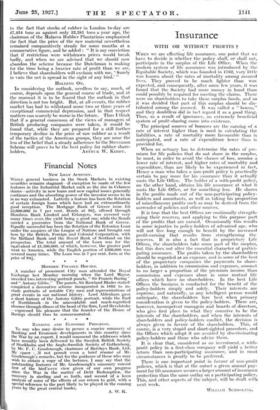Insurance
WITH OR WITHOUT PROFITS ?
WHEN we are effecting life assurance, one point that we have to decide is whether the policy shall, or shall not, participate in the surplus of the Life Office. When the modern system of life assurance was introduced by the Equitable Society, which was founded in 1762, very little was known about the rates of mortality among assured lives. They proved to be much lighter than was expected, and consequently, after some few years, it was found that the Society had more money in hand than could possibly be required for meeting the claims. There were no shareholders to take these surplus funds, and so it was decided that part of this surplus should be dis- tributed among the assured. It was called a " bonus," and they doubtless did in fact regard it as a good thing. Thus, as a result of ignorance, an extremely beneficial system of profit-sharing came into existence. . WHEN we are effecting life assurance, one point that we have to decide is whether the policy shall, or shall not, participate in the surplus of the Life Office. When the modern system of life assurance was introduced by the Equitable Society, which was founded in 1762, very little was known about the rates of mortality among assured lives. They proved to be much lighter than was expected, and consequently, after some few years, it was found that the Society had more money in hand than could possibly be required for meeting the claims. There were no shareholders to take these surplus funds, and so it was decided that part of this surplus should be dis- tributed among the assured. It was called a " bonus," and they doubtless did in fact regard it as a good thing. Thus, as a result of ignorance, an extremely beneficial system of profit-sharing came into existence. .
The principal sources of bonuses are the earning of a rate of interest higher than is used in calculating the liabilities, a rate of mortality more favourable than is anticipated, and a rate of expenditure lower than is provided for.
When an actuary has to determine the rates of pre- mium for life policies that do not share in the surplus, he must, in order to avoid the chance of loss, assume a lower rate of interest, and higher rates of mortality and expenditure, than are likely to be experienced in fact. Hence a man who takes a non-profit policy is practically certain to pay more for his, assurance than it actually costs the Life Office. The holder of a with-profit policy, on the other hand, obtains his life assurance at what it costs the Life Office, or for something less. He shares in the profits made out of the non-participating policy- holders and annuitants, as well as taking his proportion of miscellaneous profits such as may be derived from the surrender of policies and other sources, It is true that the best Offices are continually strength- ening their reserves, and applying to this purpose part of the profits that are earned. Occasionally this results in some injustice to policy-holders of advanced age, who will not live long enough to benefit by the increased profit-earning that results from strengthening the reserves. It is also a fact that in proprietary Life Offices, the shareholders take some part of the surplus, but this does not alter the essential character of partici- pating assurance. The profits taken by the shareholders should be regarded as an expense, and in some of the best of the proprietary companies the payments to share- holders, in addition to commission and expenses, amount to no larger a proportion of the premium income than commission and expenses alone in some mutual life offices which have no shareholders. In the best Life Offices the business is conducted for the benefit of the policy-holders simply and solely. Their interests are supreme, and naturally, as any intelligent person would anticipate, the shareholders fare best when primary consideration is given to the policy-holders. There are, however, incompetent managers and boards of directors, who give first place to what they conceive to be the interests of the. shareholders, and when the interests of shareholders and policy-holders conflict, the decision is always given in favour of the shareholders. This, of course, is a very stupid and short-sighted procedure, and the Offices which adopt it are avoided by discriminating policy-holders and those who advise them.
It is clear that, considered as an investment, a with- profit policy in a first-class company will yield a better return than non-participating assurance, and in most circumstances is greatly to be preferred.
There is one important point in favour of non-profit policies, which is that at the outset a given annual pay- ment for life assurance secures a larger amount of insurance protection than the same outlay on a participating policy. This, and other aspects of the subject, will be dealt with next week.
WILLIAM SCHOOLING.














































 Previous page
Previous page